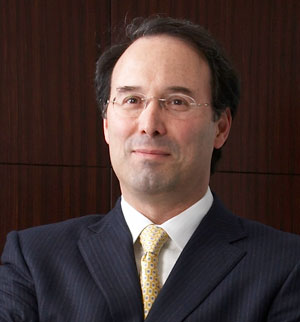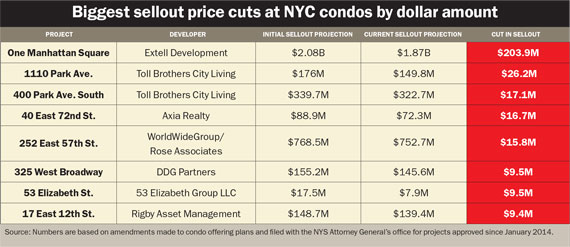No developer likes to cut prices. Many will resort to incentives and other giveaways to avoid the negative optics of a discount. But a number of new condominiums have quietly adjusted their sellout plans amid a softening market.
These aren’t the kind of fire sales seen during the financial crisis of 2008. Rather, many are tweaks or recalibrations. Still, they do represent a noteworthy shift in the market.
To quantify just how widespread these downward adjustments are, The Real Deal analyzed projects approved by the New York State Attorney General’s office since January 2014 and ranked them based on the dollar amount cut from the offering plan.
Overall, we sifted through hundreds of plans and analyzed drops at around 40 projects.
To be sure, not all condos are in price-chopping mode. In fact, many buildings that have filed for AG approval since 2014 have raised prices, including some of the most expensive buildings in Manhattan.
Still, in a telling sign, many of the drops that TRD identified have taken place since the start of 2016.
Extell Development’s One Manhattan Square on the Lower East Side topped the list, lowering its total sellout projection by about $204 million. That project was followed by Toll Brothers’ 1110 Park Avenue South (which knocked $26.2 million off its projected sellout) as well as Toll’s 400 Park Avenue South (which lowered its projection by $17.1 million).
But different projects slashed prices for different reasons — and at different phases in their market cycles.
For example, Toll dropped prices to reinvigorate in-progress sales. Extell, however, adjusted its prices before launching sales this summer at the 815-unit condo project, which is reportedly targeting Asian buyers.
“We’re going to be very conservative here,” Extell chief Gary Barnett told TRD. Barnett also disputed the “price cut” characterization, instead describing it as a strategic move that will set the building up competitively out of the gate. In addition, he said he’d rather cut the project’s sellout price now on paper with the AG to make the project more desirable — and hopefully raise prices later once units officially hit the market. Units will mostly range from $1 million to $3 million, though there will also be two $13 million penthouses, one of which is already in contract, according to Barnett.
“We priced it where we want to start and we think we’ll raise prices from where we’re starting now,” he said.
Back in business
For developers, units that stubbornly sit on the market can be the kiss of death. Avoiding that, even at a cost, is often worth it, brokers say.

Gary Barnett
“They don’t see the [sales] momentum,” said Billy Goldstein, managing director of new development at Compass. “They see traffic but they don’t see offers.”
He said several Manhattan condo buildings currently on the market have either lowered prices — or should — to really “tell the market they are in business.”
That was the case at The Stahl Organization’s 388 Bridge, which launched 18 months ago to such fanfare that one buyer’s agent brought a busload of people to the first open house, according to Bill Ross, a managing director at Halstead Property Development Marketing, the building’s exclusive sales agent. “We had an emergency meeting to raise prices at that time,” he recalled.
The developer sold 122 units at the building — which has 144 condos and 234 rental units — but with just 22 condos left to unload, traffic dropped. A line of one-bedrooms was particularly problematic since it overlooked an adjacent construction site. “You’d walk in and see this huge crane swinging,” said Ross, who championed a 10 percent price reduction, which took effect in late 2015.
The building is not on TRD’s list despite cutting prices because the current sellout projection is still higher than the initial pricing.
Stahl also cut prices when a line of two-bedrooms, ranging from $1.15 million to just over $1.5 million, experienced a slowdown. “The last unit below $1.5 million sold and then traffic disappeared,” Ross said. The developer then opted to drop prices by $20,000 to get all units priced under $1.5 million sold.
“It could be psychological, considering the jump in traffic when we advertised at $1.495 million,” Ross said, adding that search engine results would not have included the units just over $1.5 million.
Compass’ Goldstein, however, noted that not all developers have the financial flexibility to lower prices. It depends, of course, on their cost basis, which determines whether price chops will eat into their returns. “Land prices have become incredibly steep, so they need the highest dollar possible to make money,” he said.
Instead, several buildings have offered incentives for both buyers and brokers.
Alchemy Properties recently offered a $50,000 American Express gift card to brokers for bringing the developer a signed contract at 35 West 15th Street by April 15. At the 93-unit 252 East 57th Street, World Wide Group and Rose Associates, meanwhile, have offered brokers 4 percent commission — up from the standard 3 percent — and the developers pledged to pay 1 percent of any commission within 60 days of signing a contract.
In addition to broker incentives, the developers at 252 East 57th cut prices in late January to remain competitive as more units hit the market, particularly along Billionaires’ Row, where buildings like Vornado Realty Trust’s 220 Central Park South and JDS Development Group’s 111 West 57th Street are under construction.
For example, a five-bedroom spanning nearly 5,000 square feet is now asking $16.2 million, down from $19 million, and a four-bedroom is now listed at $12.4 million, down from $13.4 million.
“The developers know that there is more inventory coming to market,” said Pamela D’Arc of Stribling & Associates, which is marketing the building. “They want to keep [sales momentum] moving forward.”
Avoiding oversaturation
Other developers are employing the tried-and-true strategy of holding units off the market to avoid an oversaturation of inventory. The trend seems to have taken hold at the end of 2015.
According to real estate appraisal firm Miller Samuel, new condo inventory fell 45 percent during 2015’s fourth quarter compared to a year earlier, a phenomenon founder Jonathan Miller attributed to developers holding inventory back.
“We’ve clearly seen a sharp decline in activity, particularly at the high end of the market,” he said. “When the pace falls, you don’t want a 50-day marketing time tagged to your listing. You pull back on what you put on.”
While the prices for new condos are still rising — the average Manhattan sale price rose 4.3 percent to $3.29 million during the fourth quarter from the prior year — the gains have slowed. Between the fourth quarters of 2013 and 2014, prices jumped a much higher 17.2 percent.
Miller said many condo projects now coming online set their prices a year or two ago amid different market conditions. Smart developers are bringing their units to market with prices that are realistic for today’s buyers.
“Developers need to be in sync with what the market is willing to pay,” he said. “If you price it correctly from the get go, you’ll see a faster absorption rate than if you knowingly go into the market overpriced.”
Barnett told TRD that Extell had a “fair amount” of pre-sale commitments at the original prices. The company has since given those buyers a partial refund. “If we had gone at the earlier pricing, we didn’t think we’d raise prices,” he said.
Overall, he said New York City’s economy is still strong and that a lot of the product that’s sitting on the market is either poorly conceived or is overpriced.
“The super-luxury end, of course, has slowed down because there is a lot of building,” he said. “We’re actually way undersupplied with product the market wants at prices the market wants.”
Toll Brothers declined to comment for this article, but CEO Douglas Yearley Jr. likewise outlined plans to become “more aggressive in pricing” at both 1110 Park and at 400 Park, where the company also cut its projected sellout price, during a December earnings call. More recently, he told investors that Manhattan prices had stabilized. “I think we found the right price,” he said, during a Feb. 23 earnings call.

